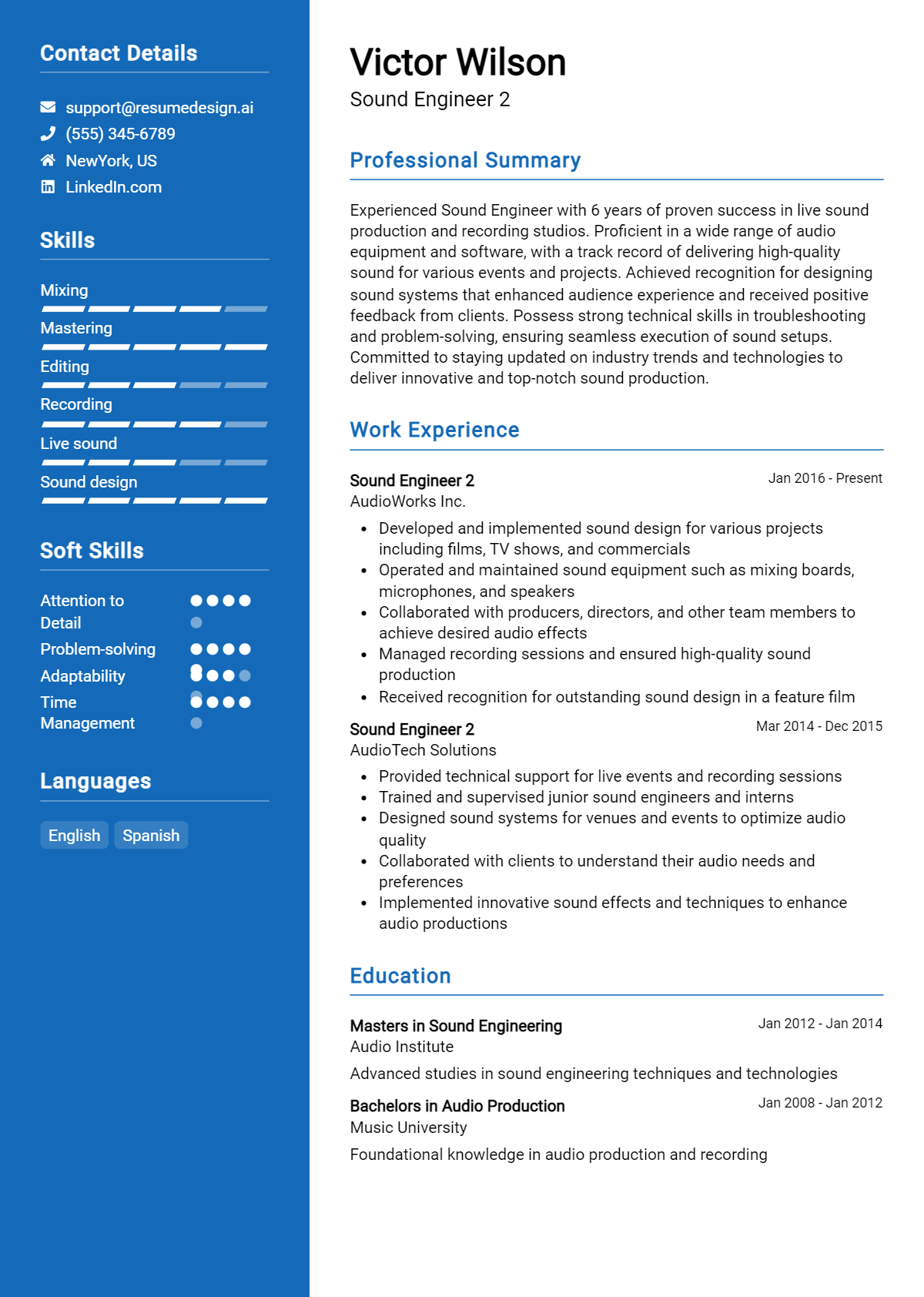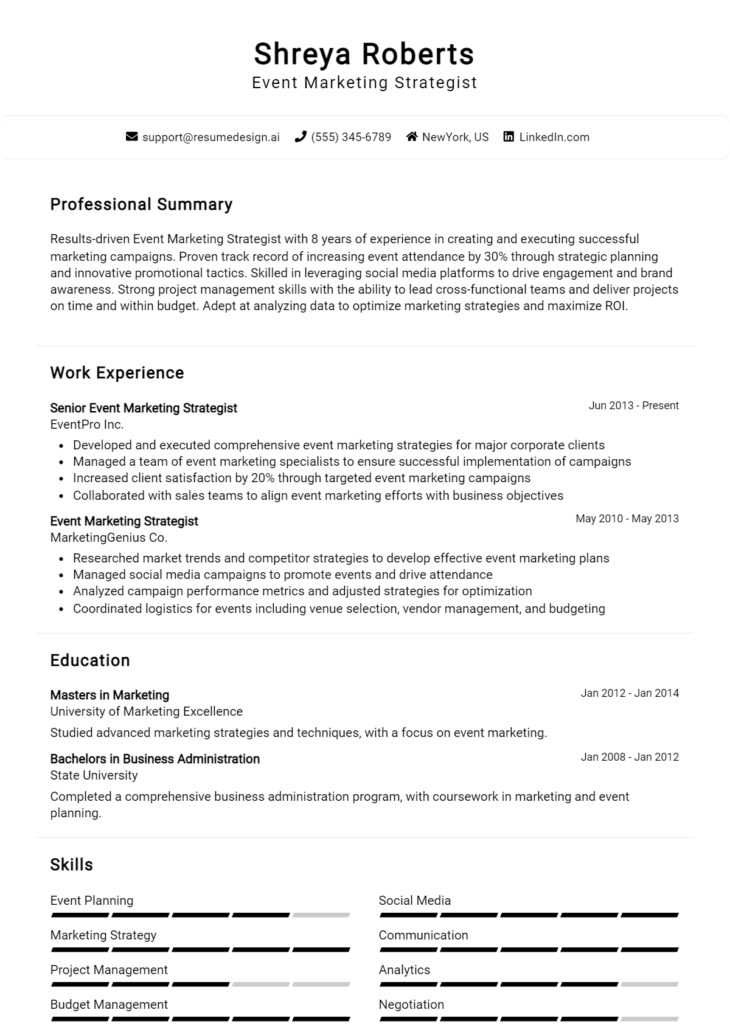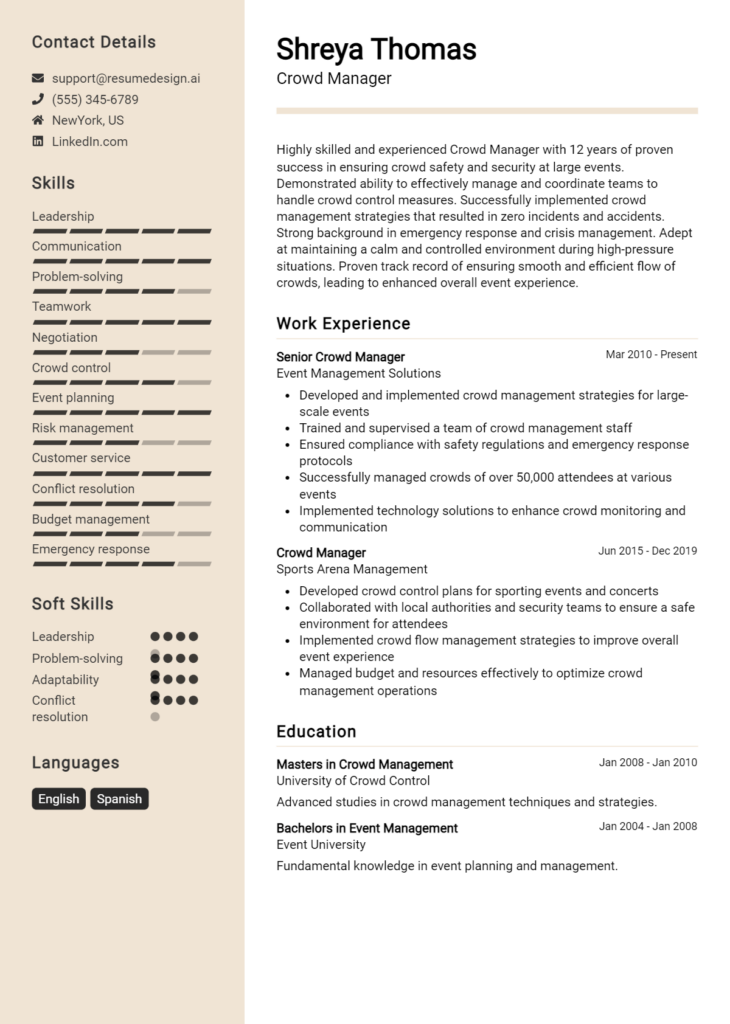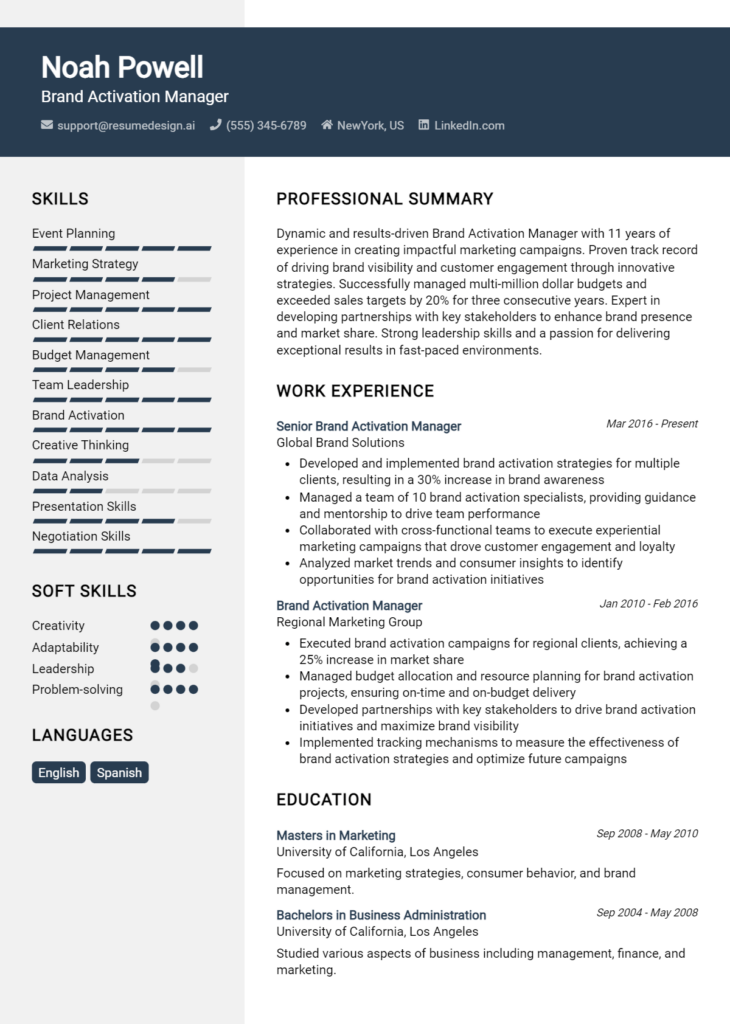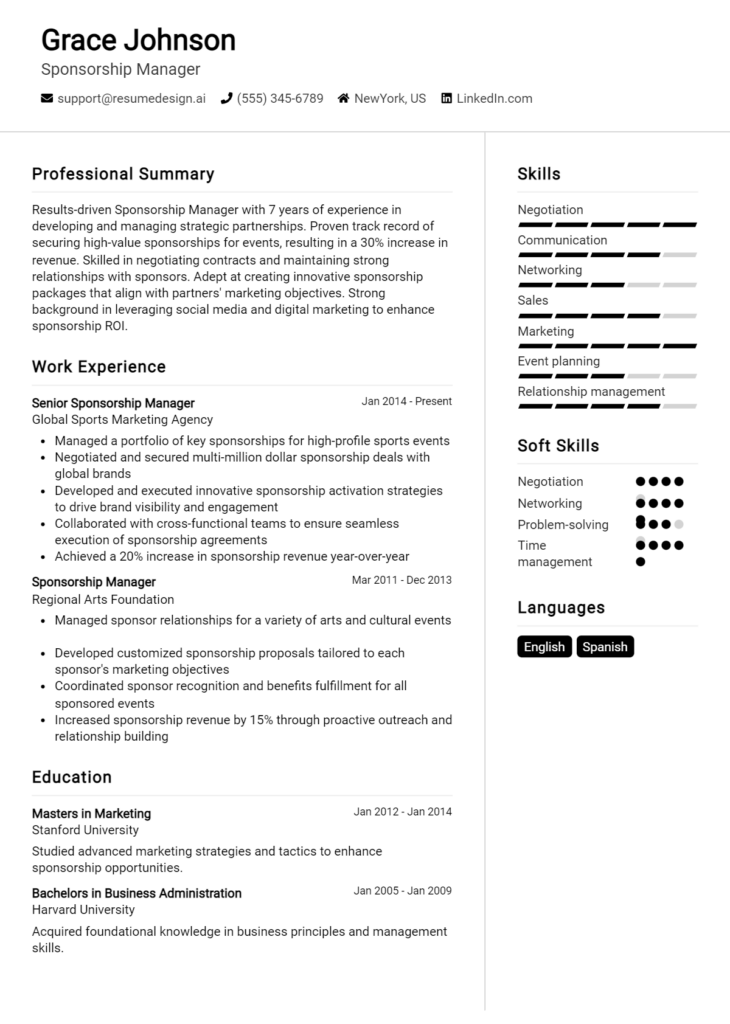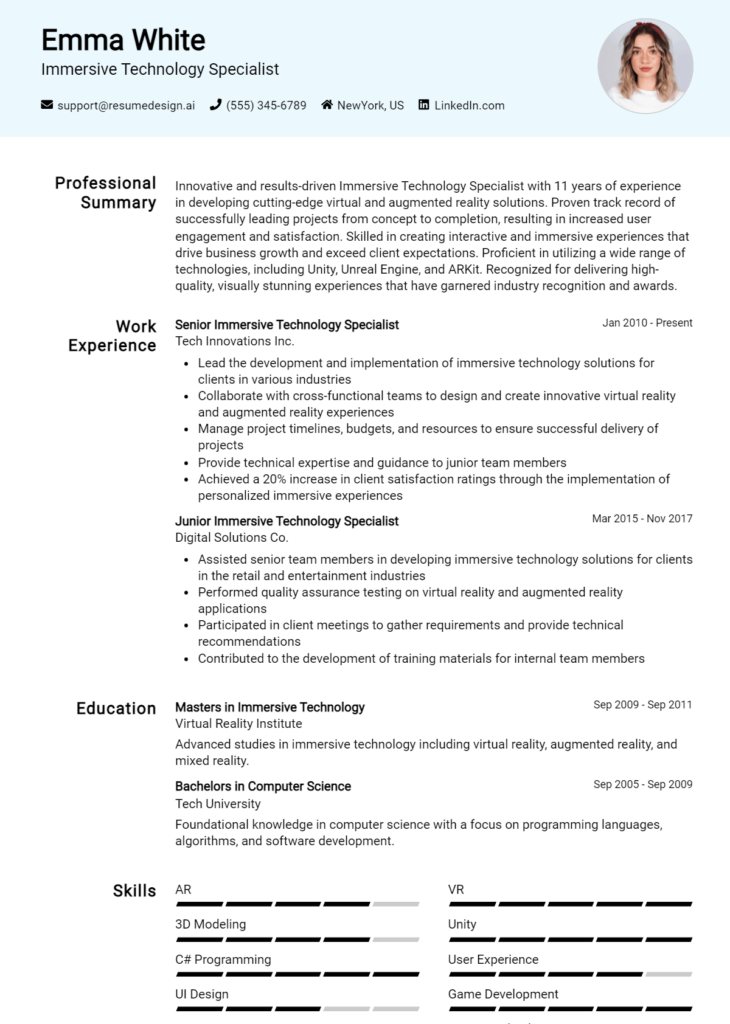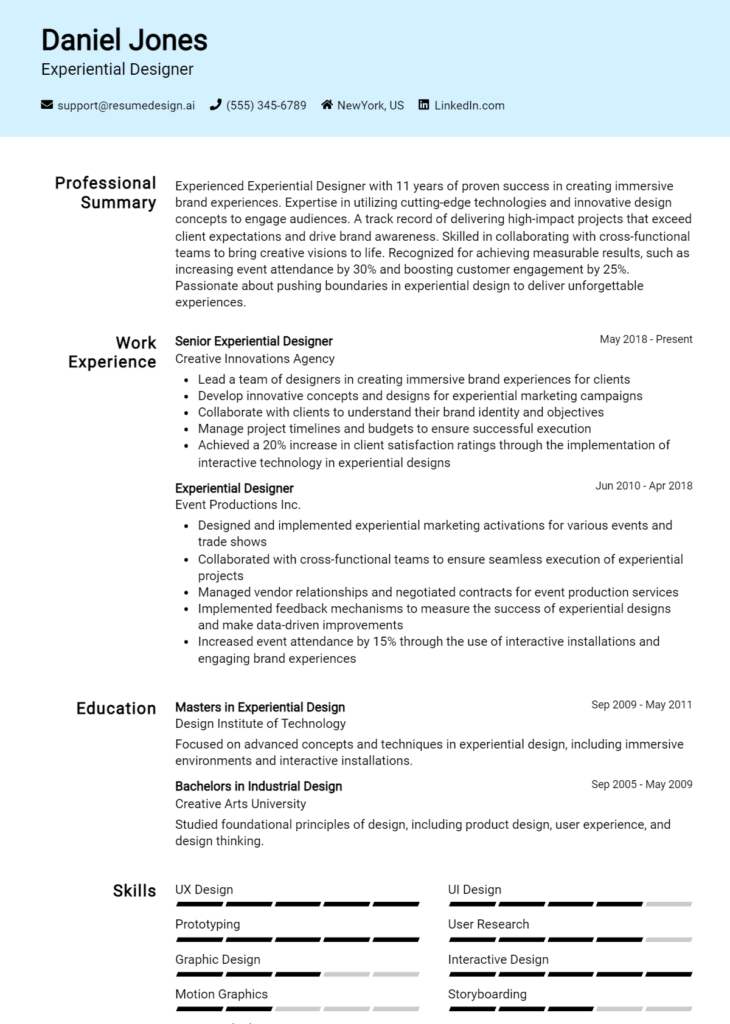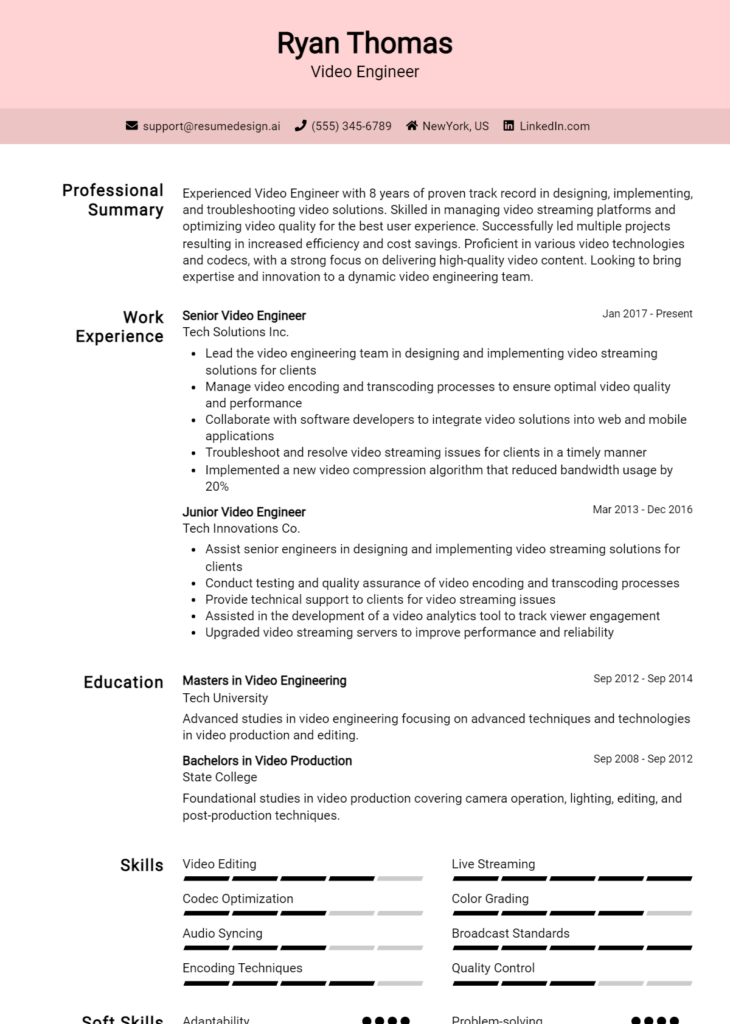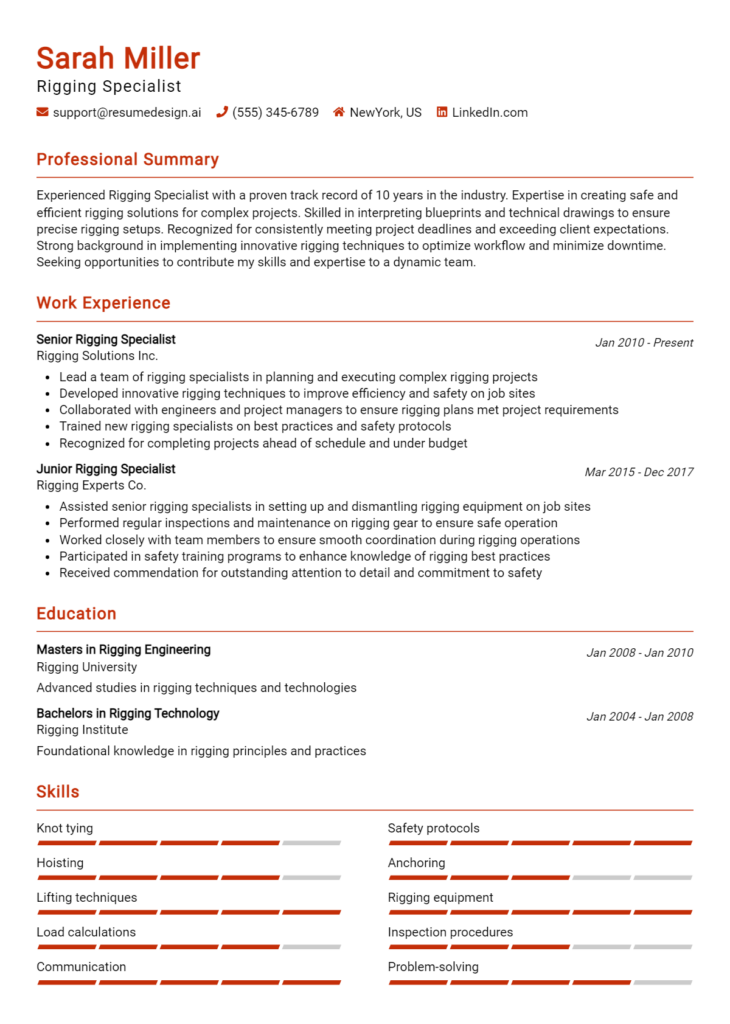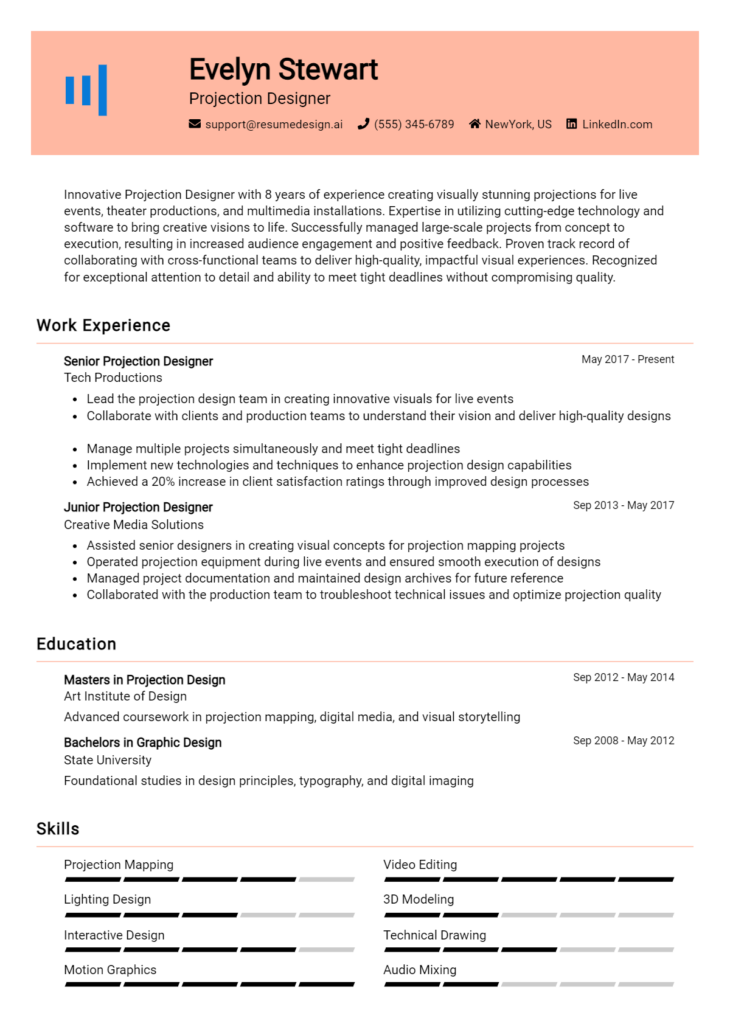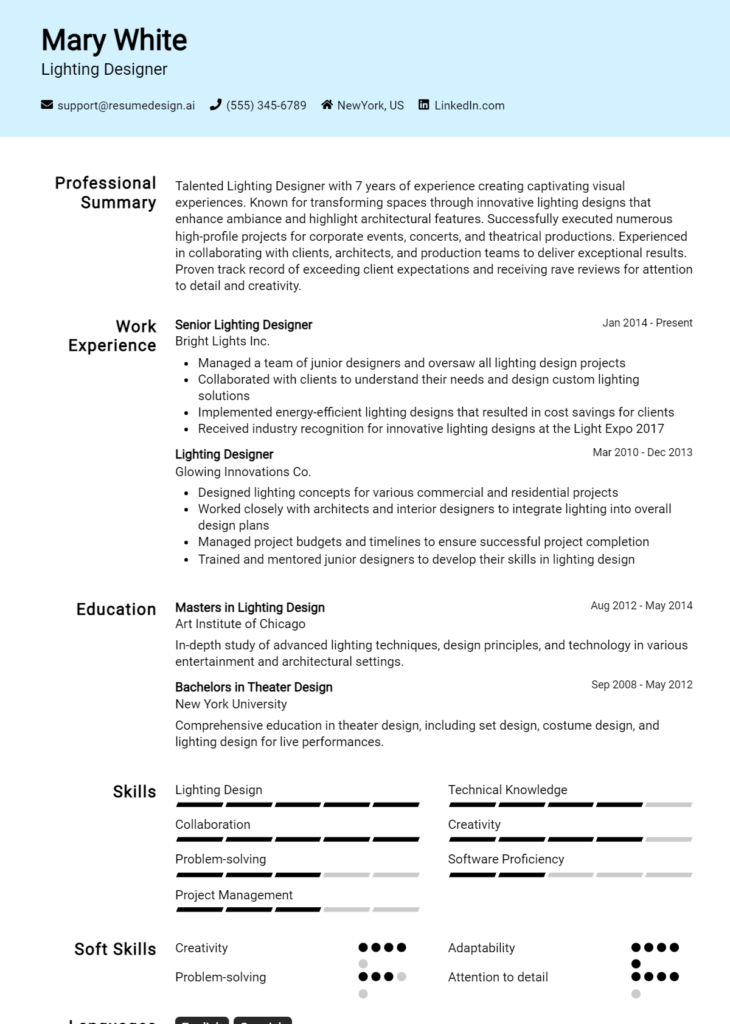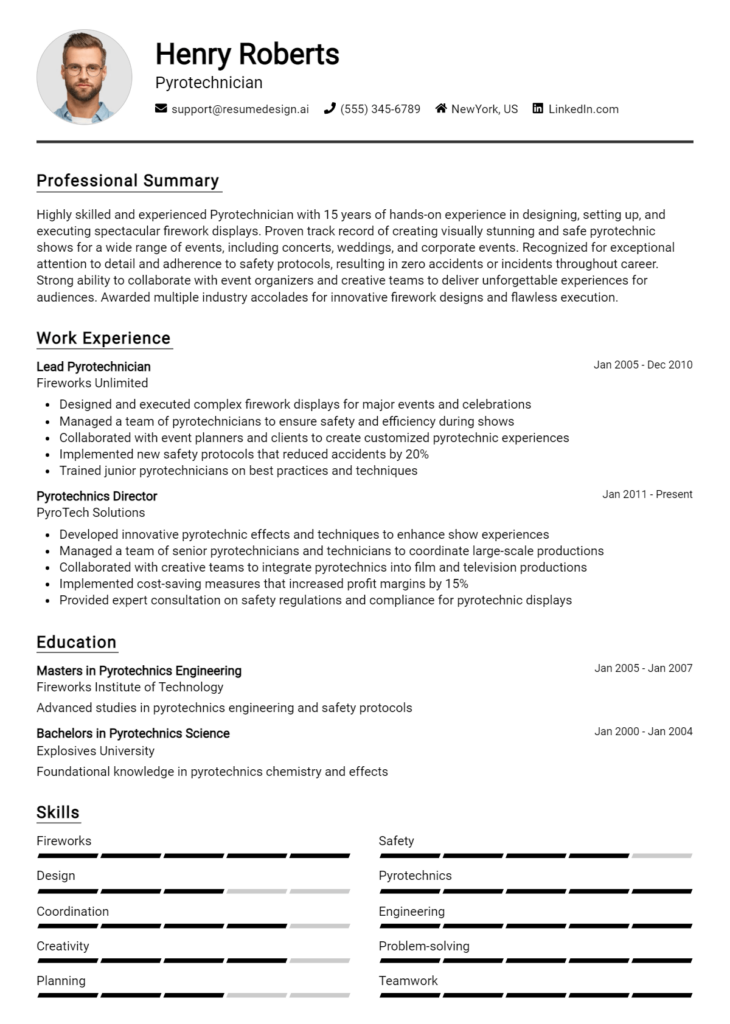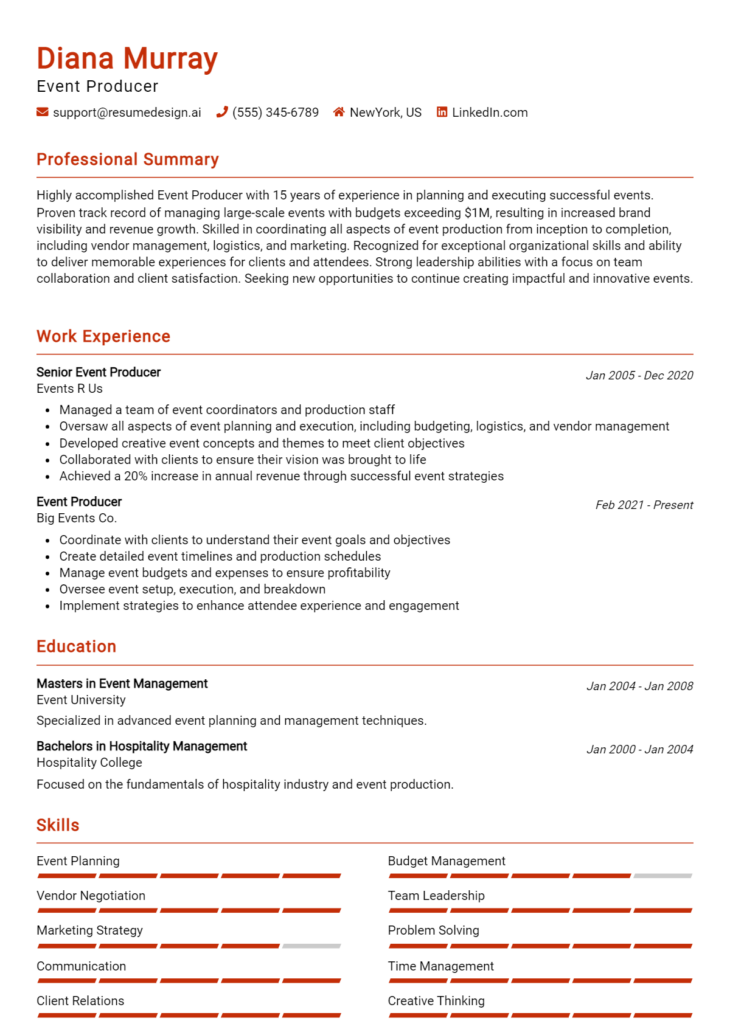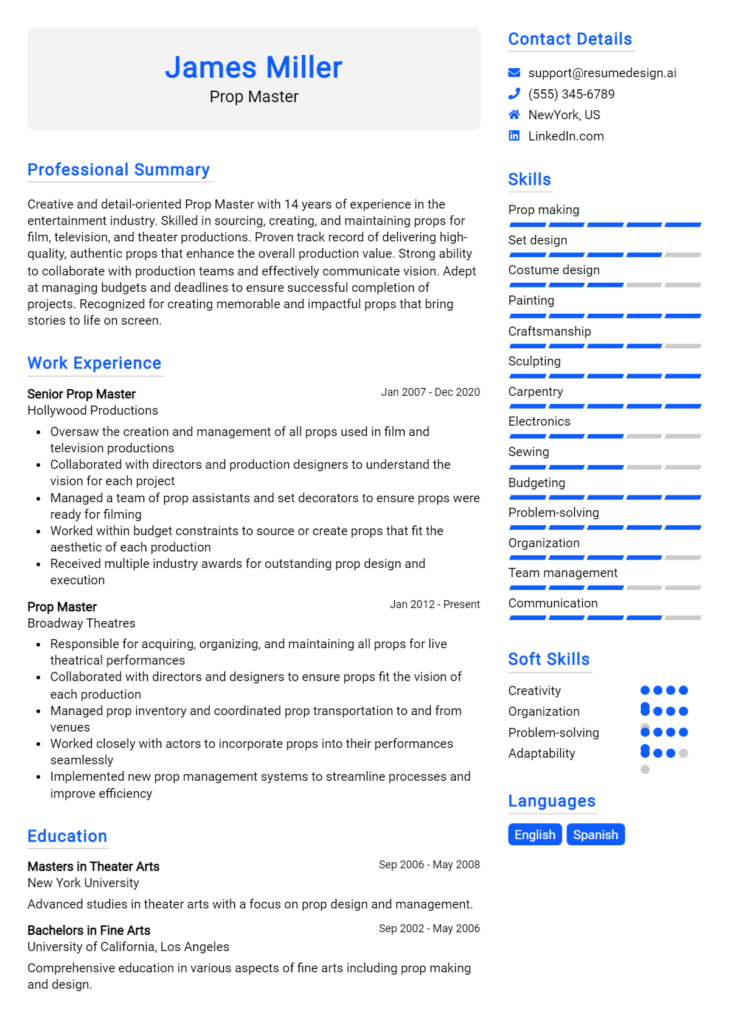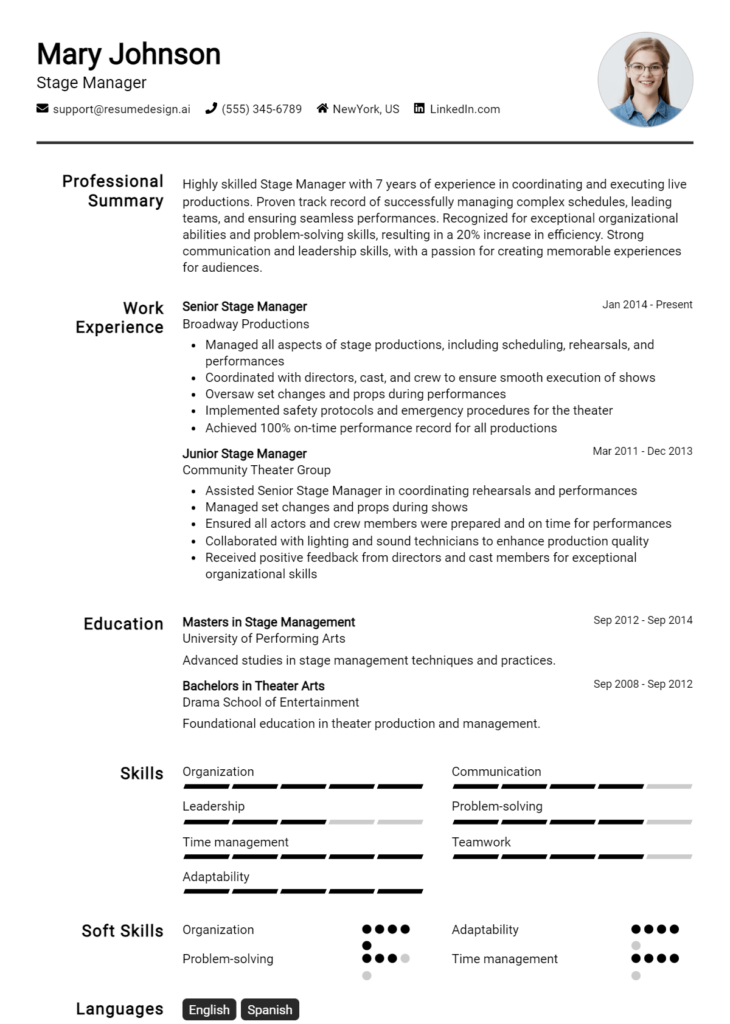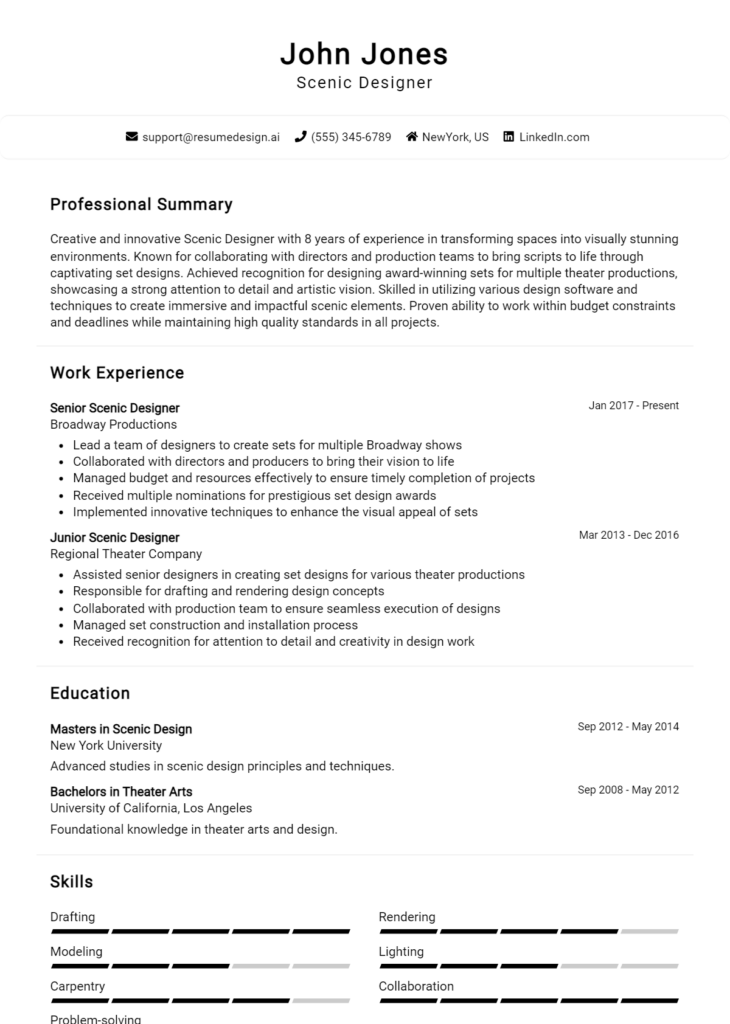Sound Engineer Core Responsibilities
A Sound Engineer plays a crucial role in the production process, bridging creative and technical departments to ensure high-quality audio output. Key responsibilities include operating sound equipment, mixing audio tracks, and collaborating with producers and artists. Essential skills include technical proficiency with audio software, operational awareness of sound systems, and strong problem-solving abilities. These competencies are vital in achieving the organization's goals, and a well-structured resume can effectively highlight these qualifications to prospective employers.
Common Responsibilities Listed on Sound Engineer Resume
- Setting up and testing audio equipment before recording sessions
- Mixing and editing audio tracks for clarity and quality
- Collaborating with artists and producers to achieve desired sound
- Monitoring sound levels during live performances
- Maintaining and troubleshooting audio equipment
- Recording sound in studio and field environments
- Creating sound effects and soundscapes for various media
- Ensuring compliance with safety and industry standards
- Providing technical support during live events
- Documenting audio production processes and setups
- Continuously updating skills with new technology and software
High-Level Resume Tips for Sound Engineer Professionals
In the competitive field of sound engineering, a well-crafted resume serves as your first handshake with potential employers, setting the tone for your professional identity. A strong resume not only showcases your technical skills and achievements but also conveys your passion for sound and audio production. As the initial point of contact, it is essential that your resume reflects your unique qualifications and experience in a manner that resonates with hiring managers. This guide will provide practical and actionable resume tips specifically tailored for Sound Engineer professionals, ensuring you make a memorable impression that opens the door to your next opportunity.
Top Resume Tips for Sound Engineer Professionals
- Tailor your resume to the job description, highlighting relevant skills and experiences that match the specific requirements of each position.
- Showcase your relevant experience by including specific projects, roles, and responsibilities that demonstrate your expertise in sound engineering.
- Quantify your achievements with metrics, such as the number of projects completed, efficiency improvements, or client satisfaction ratings.
- Highlight industry-specific skills, such as proficiency with audio editing software, mixing techniques, or live sound setups.
- Include a portfolio link to showcase your work, featuring audio samples or links to projects that highlight your capabilities.
- Utilize keywords from the job description to increase your chances of passing through applicant tracking systems (ATS).
- Organize your resume clearly, using headings and bullet points to make it easy for hiring managers to scan for relevant information.
- Incorporate any certifications or training relevant to sound engineering, such as courses in audio technology or specialized equipment training.
- Keep the design professional and uncluttered, ensuring that the focus remains on your skills and experiences.
By implementing these tips, you can significantly enhance your resume, increasing your chances of landing a job in the Sound Engineer field. A polished and tailored resume will not only highlight your qualifications but also demonstrate your commitment to your craft, making you a standout candidate in a competitive job market.
Why Resume Headlines & Titles are Important for Sound Engineer
In the competitive field of sound engineering, a well-crafted resume headline or title serves as a powerful tool for candidates to make a memorable first impression. This concise phrase can immediately capture the attention of hiring managers, summarizing a candidate's key qualifications and setting the tone for the rest of the resume. A strong headline should be relevant to the specific position being applied for, reflecting the individual's unique skills, experiences, and accomplishments. By distilling their professional identity into a single impactful phrase, candidates can effectively showcase their value in a way that resonates with potential employers.
Best Practices for Crafting Resume Headlines for Sound Engineer
- Keep it concise: Aim for one to two impactful phrases.
- Be specific: Tailor the headline to reflect the specific sound engineering role.
- Highlight key skills: Include relevant technical skills or certifications.
- Use strong action verbs: Start with dynamic words that convey expertise.
- Incorporate quantifiable achievements: Mention notable projects or results.
- Reflect your unique selling proposition: Distinguish yourself from other candidates.
- Stay relevant: Ensure the headline aligns with the job description.
- Avoid jargon: Use clear language that can be easily understood.
Example Resume Headlines for Sound Engineer
Strong Resume Headlines
"Award-Winning Sound Engineer with 10+ Years in Live Audio Production"
“Creative Sound Designer Specializing in Film and Video Game Audio”
“Expert Mixing Engineer Committed to Delivering High-Quality Soundscapes”
“Innovative Sound Technician with Proven Track Record in Studio Recording”
Weak Resume Headlines
“Sound Engineer Looking for Work”
“Experienced Professional”
“Audio Specialist”
The strong headlines are effective because they clearly communicate the candidate’s unique strengths and relevant experience, making it easy for hiring managers to identify their qualifications at a glance. They include specific details that align with the role and showcase the candidate's accomplishments, which can set them apart in a crowded job market. In contrast, the weak headlines fail to impress due to their vagueness and lack of specificity; they do not provide any insight into the candidate's skills or what makes them a suitable fit for the position, making it difficult for hiring managers to engage further with the resume.
Writing an Exceptional Sound Engineer Resume Summary
A resume summary is a critical component for a Sound Engineer, serving as the first impression a hiring manager receives. This brief yet powerful section quickly captures attention by highlighting key skills, relevant experience, and notable accomplishments that align with the job role. A well-crafted summary is concise and impactful, tailored to the specific position being applied for, and effectively communicates the candidate's unique value proposition in the competitive field of sound engineering.
Best Practices for Writing a Sound Engineer Resume Summary
- Quantify achievements: Use numbers to demonstrate your impact, such as the number of projects completed or the percentage of client satisfaction.
- Focus on relevant skills: Highlight technical skills specific to sound engineering, such as proficiency in audio mixing, mastering, and software tools.
- Tailor the summary: Customize your summary to align with the job description, using keywords that resonate with the hiring manager.
- Be concise: Keep your summary to 2-4 sentences to ensure it is easy to read and digest.
- Showcase accomplishments: Mention significant projects or roles that showcase your expertise and contributions to past employers.
- Use action verbs: Start sentences with strong action verbs to convey a sense of proactivity and results-oriented thinking.
- Maintain professionalism: Use a formal tone and avoid slang or overly casual language to ensure your summary reflects your professionalism.
- Include industry-specific terminology: Use terms that are common in the sound engineering field to demonstrate your familiarity and expertise.
Example Sound Engineer Resume Summaries
Strong Resume Summaries
Dynamic Sound Engineer with over 5 years of experience in live sound production, successfully managing audio for events with up to 10,000 attendees, achieving a 95% client satisfaction rate through exceptional sound quality and technical expertise.
Detail-oriented Audio Engineer skilled in mixing and mastering with Pro Tools and Logic Pro, having improved audio clarity for over 50 commercial recordings, resulting in a 30% increase in streaming revenue for clients.
Accomplished Sound Designer with a strong background in film and video game audio, recognized for winning the Best Sound Award at the 2022 Indie Film Festival, and proficient in creating immersive soundscapes that enhance storytelling.
Weak Resume Summaries
Experienced Sound Engineer looking for opportunities to work with sound.
I have worked in audio engineering for a few years and am interested in sound-related jobs.
The strong resume summaries are effective because they provide specific details about the candidates' experiences and accomplishments, showcasing quantifiable results and relevant skills that appeal directly to potential employers. In contrast, the weak summaries lack specificity, fail to highlight measurable achievements, and do not demonstrate a clear understanding of the role, making them less compelling to hiring managers.
Work Experience Section for Sound Engineer Resume
The work experience section is a critical component of a Sound Engineer resume, as it serves as a platform for candidates to demonstrate their technical skills, leadership capabilities, and ability to deliver high-quality audio products. This section not only highlights the candidate's past roles and responsibilities but also emphasizes their achievements and contributions to various projects. By quantifying these accomplishments and aligning them with industry standards, candidates can provide potential employers with a clear understanding of their value and expertise in sound engineering.
Best Practices for Sound Engineer Work Experience
- Focus on quantifiable achievements, such as percentage improvements in sound quality or efficiency.
- Highlight specific technical skills used, such as software proficiency or equipment expertise.
- Emphasize collaboration with other team members, showcasing teamwork in high-pressure environments.
- Use industry-standard terminology to align your experience with what employers seek.
- Detail your role in project management, including timelines, budgets, and deliverables.
- Include relevant certifications or training that enhance your technical credibility.
- Tailor your experience to fit the job description, ensuring relevance to prospective employers.
- Showcase any leadership roles or responsibilities, illustrating your ability to guide teams effectively.
Example Work Experiences for Sound Engineer
Strong Experiences
- Led a team of five sound engineers in a high-profile concert production, improving audio fidelity by 30% through innovative mixing techniques.
- Streamlined the audio post-production process, resulting in a 25% reduction in turnaround time for projects while maintaining superior sound quality.
- Collaborated with directors and producers on multiple film projects, ensuring seamless integration of sound design that enhanced audience engagement, yielding a 15% increase in viewer ratings.
- Implemented a new sound recording system that reduced equipment downtime by 40%, significantly increasing overall production efficiency.
Weak Experiences
- Worked on various sound projects.
- Assisted with sound setup at events.
- Helped in mixing audio for different productions.
- Responsible for operating sound equipment.
The examples of strong experiences stand out due to their specificity and quantifiable results, demonstrating clear leadership and collaboration in significant projects. In contrast, the weak experiences are vague and lack measurable outcomes, failing to convey the candidate's technical expertise or impact on their team or projects. A resume that highlights strong experiences will significantly increase a candidate's chances of impressing potential employers in the competitive field of sound engineering.
Education and Certifications Section for Sound Engineer Resume
The education and certifications section of a Sound Engineer resume is crucial in establishing the candidate's qualifications and expertise in the field. This section not only showcases the academic background of the candidate but also highlights relevant industry certifications that demonstrate a commitment to continuous learning and professional development. By providing details on relevant coursework, specialized training, and recognized credentials, candidates can significantly enhance their credibility and improve their alignment with the specific requirements of the job role, making them more attractive to potential employers.
Best Practices for Sound Engineer Education and Certifications
- Focus on relevant degrees, such as Music Production, Audio Engineering, or Sound Design.
- Include industry-recognized certifications, such as Avid Pro Tools Certification or Adobe Audition Certification.
- List relevant coursework that directly supports the competencies required for sound engineering.
- Highlight any specialized training in audio mixing, mastering, or live sound techniques.
- Prioritize recent educational achievements to reflect current knowledge and skills.
- Use clear and concise descriptions to convey the significance of each credential.
- Consider including online learning courses or workshops from reputable platforms to show commitment to growth.
- Tailor the education and certifications section to match the specific job description and requirements.
Example Education and Certifications for Sound Engineer
Strong Examples
- Bachelor of Arts in Audio Engineering, University of Southern California, 2020
- Avid Pro Tools Certified User, 2021
- Certificate in Music Production, Berklee College of Music Online, 2022
- Advanced Audio Mixing Techniques, SAE Institute, 2023
Weak Examples
- Bachelor of Science in Business Administration, 2015
- Certificate in Basic Computer Skills, 2014
- High School Diploma, 2010
- Outdated certification in Windows Movie Maker, 2012
The strong examples are considered relevant because they directly pertain to sound engineering, showcasing both formal education and certifications that are recognized in the industry. These credentials indicate a solid foundation in audio concepts and practical skills necessary for the role. Conversely, the weak examples are less effective as they either reflect unrelated fields of study, outdated skills, or basic qualifications that do not align with the specialized knowledge required for a Sound Engineer position. These weaknesses can detract from the candidate's overall appeal in a competitive job market.
Top Skills & Keywords for Sound Engineer Resume
A well-crafted resume for a Sound Engineer is crucial in showcasing the right skills that align with the demands of the industry. Sound Engineers play a vital role in the production of music, film, and live events, where technical expertise and interpersonal abilities come into play. Highlighting both hard and soft skills on a resume not only demonstrates proficiency in technical tasks but also reflects the ability to collaborate effectively with artists, producers, and other team members. As the industry evolves, having a diverse skill set can make a candidate stand out, enhancing their chances of securing a position in a competitive job market.
Top Hard & Soft Skills for Sound Engineer
Soft Skills
- Attention to Detail
- Communication Skills
- Problem-Solving Abilities
- Team Collaboration
- Time Management
- Adaptability
- Creativity
- Critical Thinking
- Active Listening
- Interpersonal Skills
Hard Skills
- Proficiency in Digital Audio Workstations (DAWs)
- Knowledge of Sound Mixing Techniques
- Experience with Audio Editing Software
- Understanding of Signal Flow
- Familiarity with Microphone Placement
- Skills in Live Sound Reinforcement
- Ability to Operate Audio Equipment
- Knowledge of Acoustic Treatment
- Experience with MIDI Programming
- Understanding of Music Theory
By effectively showcasing both skills and work experience, Sound Engineers can create a compelling resume that highlights their qualifications and readiness for the challenges of the industry.
Stand Out with a Winning Sound Engineer Cover Letter
Dear [Hiring Manager's Name],
I am writing to express my enthusiasm for the Sound Engineer position at [Company Name] as advertised on [Job Posting Source]. With a solid foundation in audio engineering, extensive experience in live sound production, and a keen ear for detail, I am eager to contribute my skills to your dynamic team. My background in managing sound for diverse events, including concerts, corporate events, and theatrical productions, has equipped me with the technical expertise and creative problem-solving abilities necessary to excel in this role.
Throughout my career, I have honed my abilities in mixing, mastering, and sound design, working closely with artists and production teams to achieve the highest quality audio experience. At [Previous Company Name], I successfully managed sound for over 50 live events, ensuring clear, balanced sound that enhanced the audience's experience. My proficiency with industry-standard software and hardware, including Pro Tools, Logic Pro, and various digital audio workstations, allows me to adapt quickly to any project environment. Additionally, my strong communication skills enable me to collaborate effectively with musicians and technical staff, ensuring that each project runs smoothly from inception to completion.
I am particularly drawn to [Company Name] because of your commitment to innovation in sound production and your reputation for delivering exceptional audio experiences. I am excited about the opportunity to contribute my expertise to your projects and to grow alongside your talented team. I am confident that my passion for sound engineering and my proactive approach to problem-solving will make me a valuable asset to [Company Name].
Thank you for considering my application. I look forward to the possibility of discussing how I can contribute to the continued success of [Company Name]. Please feel free to contact me at [Your Phone Number] or [Your Email Address] to arrange a conversation.
Sincerely,
[Your Name]
[Your LinkedIn Profile or Website]
[Your Address]
[City, State, Zip]
Common Mistakes to Avoid in a Sound Engineer Resume
When crafting a resume as a Sound Engineer, it's crucial to present your skills and experience effectively to stand out in a competitive field. However, many applicants make common mistakes that can hinder their chances of landing an interview. Understanding these pitfalls can help you create a polished resume that highlights your qualifications and expertise. Below are some frequent errors to avoid in your Sound Engineer resume:
Generic Objective Statement: Using a vague objective that doesn't align with the specific role can make your resume blend in with the rest. Tailor your objective to reflect your goals and how they relate to the job.
Lack of Relevant Experience: Failing to highlight your most pertinent experience can diminish your appeal. Ensure that you prioritize roles and projects that showcase your sound engineering skills.
Ignoring Technical Skills: Sound engineering relies heavily on specific technical skills and software proficiency. Omitting these details can leave hiring managers questioning your capabilities.
Overly Complex Language: Using jargon or overly technical language can confuse readers. Aim for clear, concise descriptions that are easy to understand while still conveying your expertise.
Inconsistent Formatting: A poorly formatted resume can detract from your professionalism. Maintain consistent font sizes, bullet point styles, and spacing throughout to create a clean appearance.
Neglecting Soft Skills: Focusing solely on technical abilities while ignoring soft skills such as communication and teamwork can be a mistake. Highlighting these interpersonal skills can demonstrate your ability to collaborate effectively in a team environment.
Failing to Quantify Achievements: Providing vague descriptions of your responsibilities without quantifying your achievements can weaken your impact. Use numbers and specific examples to illustrate your contributions and successes.
Not Tailoring for Each Application: Sending out the same resume for every job application can limit your chances. Customize your resume for each position to reflect the specific skills and experiences that are most relevant to the job.
Conclusion
As a Sound Engineer, creating a compelling resume is crucial to standing out in a competitive job market. Throughout this article, we have discussed the essential skills, qualifications, and experiences that should be highlighted in your resume, such as proficiency in audio editing software, knowledge of acoustics, and hands-on experience with sound equipment. Additionally, we emphasized the importance of showcasing your portfolio of work, including any notable projects or collaborations that demonstrate your expertise and creativity in sound engineering.
In conclusion, it’s time to take a critical look at your Sound Engineer resume. Ensure that it reflects your unique skills and experiences effectively. Don’t forget to utilize available resources to enhance your application. Explore our resume templates for a polished look, or utilize our resume builder for a customized experience tailored to your qualifications. You can also check out our resume examples for inspiration and review our cover letter templates to complement your resume.
Take action today and make your Sound Engineer resume a powerful tool in your job search!

